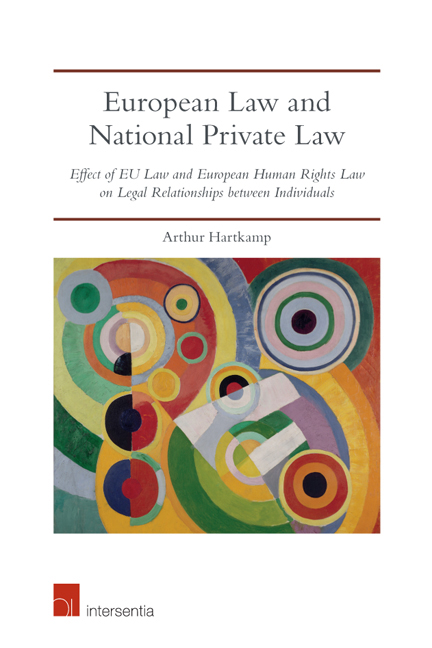 European Law and National Private Law
European Law and National Private Law from Part I - Sources of European Law and Their Influence on National Private Law
Published online by Cambridge University Press: 22 September 2018
CONCEPT OF AN EU REGULATION
Traditionally, EU legislative measures in the field of general private law are taken in the form of directives. Pursuant to Article 115 TFEU a directive is the required legal form for measures concerning the approximation of such national laws, regulations or administrative provisions of the member states as ‘directly affect the establishment or functioning of the internal market’. Some of the earliest private law directives (product liability, doorstep selling, credit agreements for consumers) are based on this article. Measures concerning the approximation of national laws and regulations of member states ‘which have as their object the establishment and functioning of the internal market’ may be taken by both directives and regulations, so Article 114 TFEU provides. Most of the directives in the field of consumer protection are based on this article; see Article 169(3) TFEU. This policy is based on paragraph 6 of the Protocol on the application of the principles of subsidiarity and proportionality, which provides that ‘other things being equal’, directives should be preferred to regulations. So it is conceivable that the Commission will in the future choose the legal form of a regulation. This would relegate to the past most of the problems of transposing EU law into national legislation and of harmonious interpretation: a regulation is a law, which is directly binding on citizens, the institutions of the EU and the member states. See also no. 162 above.
REGULATIONS IN THE FIELD OF PRIVATE LAW
There are EU regulations which, among other things, regulate matters belonging to general private law, for example the regulations in the field of payments. Regulation 1103/97 regulates the introduction of the euro and includes provisions for conversion in existing contracts. According to the ECJ (Verbraucher-Zentrale Hamburg, C-19/03, and Estager, C-359/05) this regulation gives expression to two general principles of law, namely the necessity of safeguarding legal certainty for citizens upon the transition to the euro and the related necessity of not affecting the continuity of contracts and other legal instruments by the introduction of a new currency. See also no. 136 above. On these grounds a provider of mobile telephony was refused permission to round off the price per minute to a whole eurocent upon the conversion of German marks into euros, since this would result in a significant cost increase for consumers.
To save this book to your Kindle, first ensure no-reply@cambridge.org is added to your Approved Personal Document E-mail List under your Personal Document Settings on the Manage Your Content and Devices page of your Amazon account. Then enter the ‘name’ part of your Kindle email address below. Find out more about saving to your Kindle.
Note you can select to save to either the @free.kindle.com or @kindle.com variations. ‘@free.kindle.com’ emails are free but can only be saved to your device when it is connected to wi-fi. ‘@kindle.com’ emails can be delivered even when you are not connected to wi-fi, but note that service fees apply.
Find out more about the Kindle Personal Document Service.
To save content items to your account, please confirm that you agree to abide by our usage policies. If this is the first time you use this feature, you will be asked to authorise Cambridge Core to connect with your account. Find out more about saving content to Dropbox.
To save content items to your account, please confirm that you agree to abide by our usage policies. If this is the first time you use this feature, you will be asked to authorise Cambridge Core to connect with your account. Find out more about saving content to Google Drive.